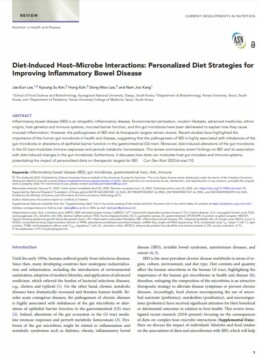Diet-Induced Host–Microbe Interactions: Personalized Diet Strategies for Improving Inflammatory Bowel Disease
Abstract
Inflammatory bowel disease (IBD) is an idiopathic inflammatory disease. Environmental sanitization, modern lifestyles, advanced medicines, ethnic origins, host genetics and immune systems, mucosal barrier function, and the gut microbiota have been delineated to explain how they cause mucosal inflammation. However, the pathogenesis of IBD and its therapeutic targets remain elusive. Recent studies have highlighted the importance of the human gut microbiota in health and disease, suggesting that the pathogenesis of IBD is highly associated with imbalances of the gut microbiota or alterations of epithelial barrier function in the gastrointestinal (GI) tract. Moreover, diet-induced alterations of the gut microbiota in the GI tract modulate immune responses and perturb metabolic homeostasis. This review summarizes recent findings on IBD and its association with diet-induced changes in the gut microbiota; furthermore, it discusses how diets can modulate host gut microbes and immune systems, potentiating the impact of personalized diets on therapeutic targets for IBD.
CategoryPeer-reviewed PublicationsDate2022.06Linkacademic.oup.com
